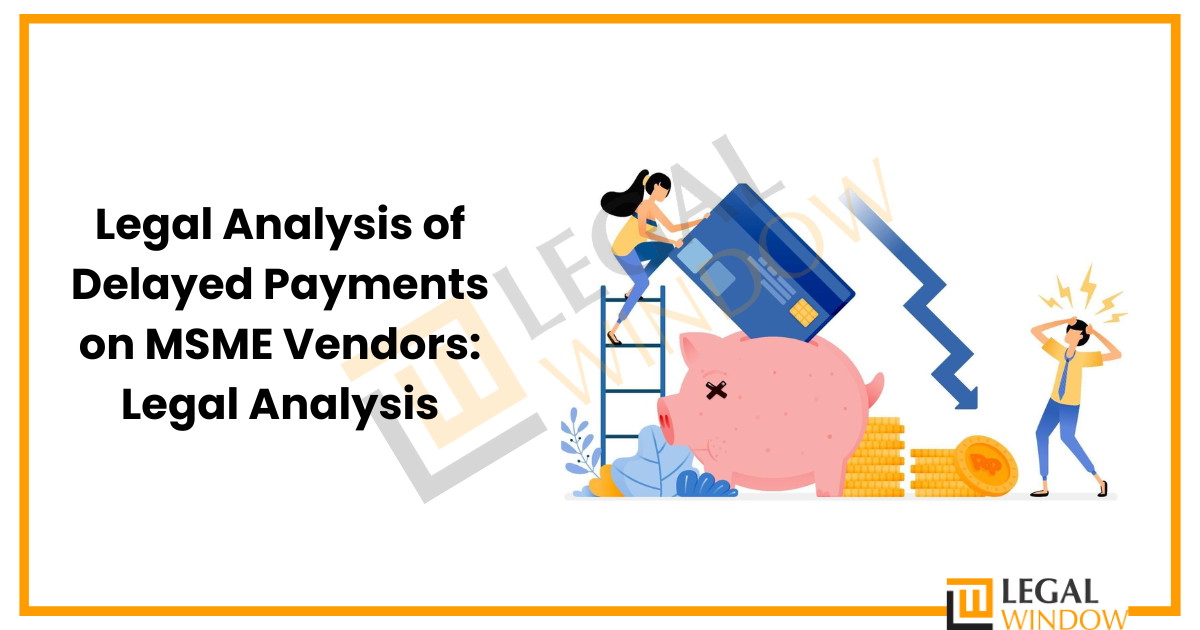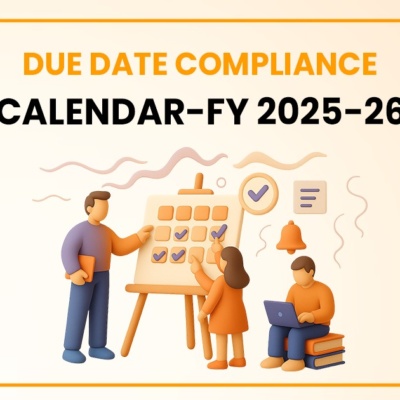
In the complex ecosystem of business transactions, timely payment play a crucial role in sustaining the high spirit of Micro, Small, and Medium Enterprises (MSMEs). However, the delay in the payments constantly haunts these crucial contributors to economic development. This present article provides you with the legal dimensions of delayed Payments on MSME Vendors. It is further discussed about the rights and remedies within the legal structure.
Table of Content
Legal Provisions for delayed payment to MSME vendors
There are certain legal provisions provided by the Companies Act, 2013 and the MSME Act, 2013:
Companies Act, 2013 provisions: The Ministry of Corporate Affairs has notified all companies, who get supplied the goods or services from micro and small companies on 22nd January 2019. That the payments to micro and small enterprise suppliers exceed forty-five days from the acceptance date or the deemed acceptance of date according to section 9 of the Micro, Small, and Medium Enterprise Development Act, 2006, shall submit a half-yearly return to the MCA in form MSME-1.
MSME ACT, 2013 provisions
- Section 15: The number of cases in the period agreed upon between the supplier and the buyer for invoice payment in writing must exceed 45 days from the day of acceptance or the day of deemed acceptance.
- Section 16:If any buyer fails to make payment to MSME vendoras per section 15, then the buyer shall, notwithstanding anything had in any agreement between the supplier and buyer or any law for the time being in force be liable to pay compound interest with monthly rests to the supplier on the amount from the appointed day. If in case, the date immediately following the date agreed upon, at three times the bank rate notified by the Reserve Bank of India rate of interest for delayed payment to MSME.
- Section 22:If any buyer is needed to get the annual accounts audited under any law for the time being in force, such buyer must mention certain details in their annual accounts statement:
- If the end of the financial year, the principal amount and the interest due thereon remain unpaid to any supplier.
- The amount incurred for interest and remains unpaid at the end of each accounting year.
- The interest paid amount by the buyer by section 16, along with the amount of the payment made to the supplier beyond the actual day of each financial year.
- The amount of interest due and paid for the time of delay in payment (that has been paid, however beyond the actual day during the year), but without further interest mentioned under the act.
- The amount of additional interest remaining due and paid on the succeeding years, until such date decided the interest dues as above are actual paid to small entities, for the aim of disallowance as a deductible expenditure as per section 23.
Impact of delayed paymentpayment to MSME Vendors
- Impact under the MSME Act: The company makespayments to MSME Vendor after days of acceptance of goods/ services:
- Financial statement report: The Company have to provide a lot of new disclosures of default as per the financial statement the company has mentioned.
- Interest on payment: In this case, the company has to pay interest on delayed payments to the MSME vendors who are registered suppliers. As per the RBI rate of interest for delayed payment to MSMEshall be three times the bank rate.
- Impact under the Companies Act: The Company makes payments to MSME vendor after five days of goods and services acceptance:
- Financial Statement report: The company needs to provide certain further details in its financial statement:
- The buyer has been paid the interest amount as per the section 16.
- The interest amount accrued and remaining unpaid at the end of each financial year.
- The principal amount and the interest due thereon.
- The amount of additional interest remaining due and payment in the succeeding years.
- The amount of due interest and payable for the period of delay in making payment.
According to the MSME Act, 2006, when the company is in delay in payments to MSME vendor. They have to pay high interest and need to reportany default in the financial statement along with other documents.
Takeaway
Through the above-mentioned information, we can say that the legal analysis of delayed payments to MSME vendors reveals a landscape marked by both opportunities and issues. As the payments delayed lead to crucial hurdles to the development and sustainability of MSMEs, the existing legal structure provides avenues for protection and recourse. By identifying the critical role of MSMEs in economic development and fostering innovation, and by upholding their rights within the legal domain, we can lead the way for a more resilient and inclusive business ecosystem.
CS Urvashi Jain is an associate member of the Institute of Company Secretaries of India. Her expertise, inter-alia, is in regulatory approvals, licenses, registrations for any organization set up in India. She posse’s good exposure to compliance management system, legal due diligence, drafting and vetting of various legal agreements. She has good command in drafting manuals, blogs, guides, interpretations and providing opinions on the different core areas of companies act, intellectual properties and taxation.
Categories
- Agreement Drafting (23)
- Annual Compliance (13)
- Change in Business (37)
- Company Law (150)
- Compliance (90)
- Digital Banking (3)
- Drug License (4)
- FEMA (17)
- Finance Company (42)
- Foreign Taxation (9)
- FSSAI License/Registration (15)
- GST (123)
- Hallmark Registration (1)
- Income Tax (213)
- Latest News (34)
- Miscellaneous (170)
- NBFC Registration (8)
- NGO (18)
- SEBI Registration (6)
- Section 8 Company (10)
- Start and manage a business (27)
- Startup/ Registration (134)
- Trademark Registration/IPR (48)
Recent Posts
All Website Tags
About us
LegalWindow.in is a professional technology driven platform of multidisciplined experts like CA/CS/Lawyers spanning with an aim to provide concrete solution to individuals, start-ups and other business organisation by maximising their growth at an affordable cost.








